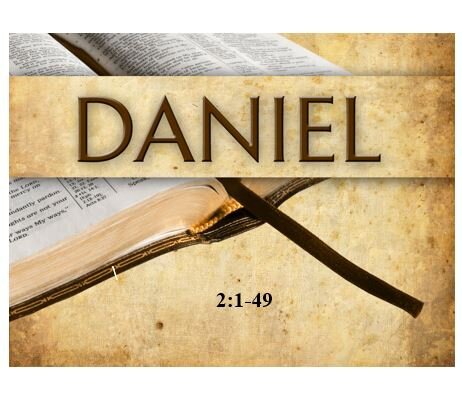BIG IDEA:
MAN’S INABILITY REQUIRES GOD’S SUFFICIENCY –TRUE WISDOM AND POWER COME FROM THE SOVEREIGN GOD
Background:
This chapter exposes man’s inability (his limitations) and God’s gracious sufficiency. In himself man is bankrupt in the realm of spiritual wisdom and power. We bring nothing to the table. However, the Sovereign God, the one who controls all of history, the one who possesse all wisdom and power, graciously gives wisdom and power to His servants as they need it.
I. MAN’S INABILITY
A. The Inability of Man’s Power (:1-6) Picture of Nebuchad.
He was frustrated. Despite all of his power he did not have the capacity for knowing and controlling the future. Therefore, despite his present success, he could not be assured of the permanency of his kingdom.
Even men of power have needs and can never be self-sufficient.
Zech. 4:6 — “Not by might nor by power (of men), but by My Spirit says the Lord of Hosts”
Our work for God cannot be forced; it depends on God’s timing, His purposes, His granting of favor and fruit
B. The Inability of Man’s Wisdom — educated men and spiritual imposters (who do not have a vital relationship with God);
Picture of the class of magicians — the wise men priests who served in the court of Nebuchad.
1. The Best Education is Insufficient
our culture tends to think education is the answer to every problem
2. The Best Experience is Insufficient — they had been offering counsel for many years
3. The Failure of Man’s Wisdom is Exposed in Time of Crisis
a. Opportunity was not the problem — they were the first ones called in by the king and asked to help
b. They had been masquerading as “servants” of the king, but really they were serving their own selfish interests (:4)
c. They tried to conceal their inability by redefining their mission (decreasing the difficulty of the task)
d. They hid behind a polite, religious facade
e. They promised much more than they could deliver
f. They feared a strict accountability (:5-6) – they were not accustomed to playing for such high stakes
g. They resort to stalling when pressed for results (:7-8) – (they believe that given enough time they can confuse people into thinking that there has been some progress)
h. They support one another in their deception and falsehood
i. When finally exposed, they seek to justify their inability
1) The task is too difficult for any man (Why didn’t they just confess this at the beginning?)
You have asked the impossible and the unreasonable
2) There is no access to divine revelation (:11)
they maintain the existence of their gods and yet the helplessness of their gods to communicate to man. These men are not channels for divine communication
J. They deserve the immediate wrath of the king (:12-13)
C. The Inability of Genuine Spiritual Leaders (in themselves)
Picture of Daniel — God’s Servant
1. The importance of an honest and prudent approach
He didn’t rant and rave and pout: “Why didn’t you come to me first?” :14-15
(we must deal with people wisely and lovingly in order to gain a hearing.)
2. The importance of confessing our need publicly
He confessed His need in 5 areas — He needed these 5 things in order to accomplish the task:
a. Insight into the nature of the problem and the urgency of of the situation
b. Time to ask God for wisdom (:16)
Required great boldness to make such a tough request to the king after the stalling of the other magicians had just been rebuked
c. Support of other godly men in corporate prayer
d. Compassion and grace of God (nothing guaranteed)
e. Revelation from God of the mystery
3. The importance of giving God all of the credit
Daniel’s response of thanksgiving (:19) showed his inability.
He was quick to give God all of the credit. He did not represent himself to the king as possessing special inherent powers. Maintain the distinction between God and man.
Some leaders forget their inability after God has worked thru them for repeated successes. The people must make sure they are trusting the resources of the All-Sufficient God rather than the charisma of a particular leader thru whom God might be working.
II. THE SUFFICIENCY OF THE SOVEREIGN GOD —
The Sovereign God Is Our Source for True Wisdom and Power (:19-23)
A. The Character of God Means Sovereignty
1. He is the God of the Heavens–in contrast to the religious superstitions of the Babylonians
2. He is worthy of all worship — Let the name of God be blessed forever and ever
3. True wisdom and power are his domain
B. The Actions of God Demonstrate His Sovereignty
1. He Controls Time and Space (all the dimensions known to man)
“changes the times and the epochs” — the message of Daniel is God’s unfolding of these times and epochs before they ever happen–an overview of world history and of the special role of Israel in God’s program
2. Source of all Authority
“removes kings and establishes kings” (Rom.13:1)
3. Source of Wisdom and Knowledge
4. Gracious to give us wisdom and power when we need it to accomplish His will (1 Cor. 1:26-31)

